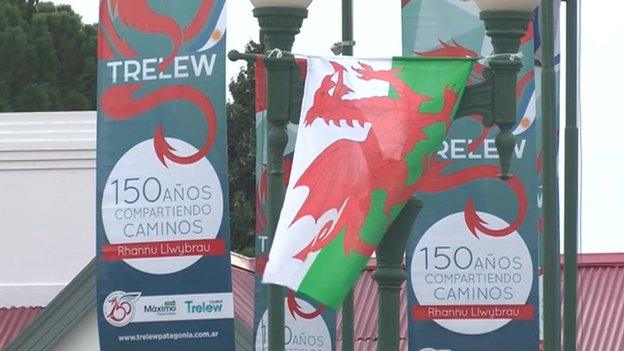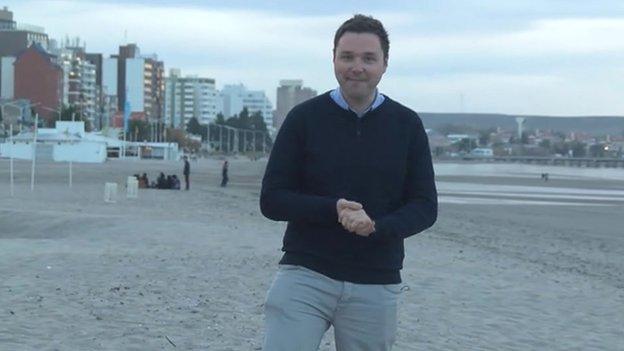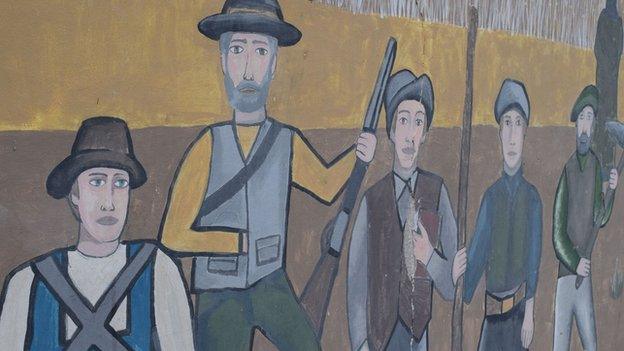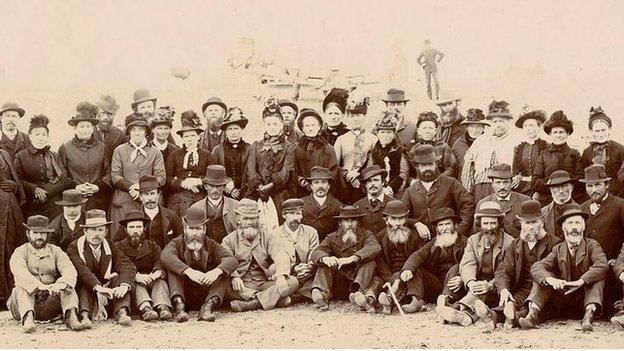Welsh celebrations in Patagonia 150 years on
- Published

150 years ago on 28 July about 160 Welsh emigrants arrived in Argentina aboard the Mimosa tea-clipper
Celebrations are taking place across Patagonia in Argentina to commemorate the region's historic links with Wales.
Wales First Minister Carwyn Jones has flown to Patagonia for the occasion.
It was 150 years ago on 28 July when about 160 Welsh emigrants arrived in Argentina aboard the Mimosa tea-clipper.
Their aim, in 1865, was to create a new settlement, 'Y Wladfa', where their language, culture and non-conformist faith could flourish.
Today, some 50,000 Patagonians can claim Welsh ancestry and the language is still spoken in parts.
The Welsh are credited with opening up the barren terrain of Chubut Province, making farming possible and helping the region to prosper.


Speaking ahead of his visit, Mr Jones said: "The descendants of Welsh settlers in Argentina have a special place in the minds of people in Wales and the reverse is also true.
"I hope this lasts long into the future and I look forward to cementing and celebrating the links that still exist, despite there being 7,500 miles between us."
The first official event to mark the 150th anniversary takes place in Puerto Madryn, where the Welsh settlers landed, on Monday evening.
Dignitaries from every state in Argentina will gather in the city's leisure centre for a gala concert.
This will feature a specially commissioned piece of music and performances by local school children.
On Tuesday morning, the arrival of the first emigrants will be re-enacted on the shore of Puerto Madryn.
Thousands are expected to attend.

Analysis by Steffan Messenger in Patagonia

"Let's Welshify our city!" reads a headline in one of Chubut Province's daily newspapers, looking ahead to the week's festivities.
The city it refers to is Puerto Madryn - a bustling, seaside resort with high-rise hotels, restaurants and bars.
But 150 years ago, when the Welsh settlers landed, there was virtually nothing here.
Standing on the beach, it is hard to imagine how they must have felt.
Homesick? Seasick? Surely disappointed.
They had been promised a land of plenty and arrived to a dusty, arid expanse.

But in braving the long journey from Liverpool they had shown a spirit of adventure.
And though some gave up, returned home or moved to other parts of the world instead - many were driven to build the new life they had dreamed of.
You get the sense here that the Welsh settlers are very much respected for their hard work in developing this part of Patagonia - building canals to irrigate the land, setting up a cooperative to trade goods and bring prosperity.
They are a small but significant part of the formation of modern Argentina.
"We may have been living in Chile now if it wasn't for the Welsh," one man tells me.
It is ironic really when you think that the founding fathers of 'Y Wladfa Gymreig' (the Welsh settlement in Patagonia) wanted above all else to create their own country anew, not bolster someone else's.
However, the way the Welsh traditions, culture and language have survived here makes Patagonia unique.
Though Welsh people emigrated in far greater numbers to North America and Australia - there is nowhere else in the world today where you can feel so far away and yet so at home.
'Real Welsh life'
The Welsh connection is now big business too - quaint Welsh tearooms and the annual eisteddfod attract hoards of Argentinean tourists.
But there is plenty of real, Welsh life under the surface.
"I'd like to visit Wales before I die," another man says in the pure and fluent Welsh he has spoken since a child.
A moment that sends a shiver down your spine.
On a building site in the town of Trevelin we witness the beginnings of a new bilingual Welsh/Spanish school.
It will become the third in Patagonia - the Welsh language is experiencing somewhat of a revival here.
Something those early pioneers would have been proud to see 150 years after setting foot in South America.
It is a remarkable story and Welsh Patagonia is a remarkable place.
- Published5 June 2015

- Published30 May 2015
